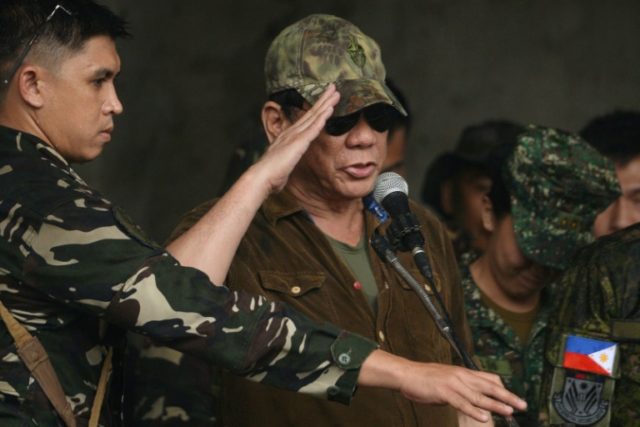Rodrigo Duterte, the ever-controversial president of the Philippines, rolled out a novel plan for reducing his military budget on Wednesday: he offered to pay a $500 bounty for every Communist insurgent killed.
“You kill an NPA today and I’ll pay you 25,000 pesos,” he said, referring to the guerrilla fighters of the New People’s Army.
Duterte explained this approach would be much cheaper than drafting a proper military budget for ongoing operations against the insurgents. “If I just pay 25,000 for a life, I can save about 47 percent,” he estimated.
As with most of Duterte’s most headline-grabbing comments, the bounty idea was not entirely serious, although it can sometimes be difficult to tell when he is joking. He spent a good deal of his speech at an airbase mocking the rebels as easy to kill, to the evident amusement of the crowd.
“If you work really hard to crawl across the forest, you’ll surely be able to shoot even just one. If you can shoot a bird above you, then how much more an NPA whose head is so big?” he said of the rebels.
As human rights groups noted with disdain, Duterte’s comedy routine about communist turkey shoots came only a week after he advised his troops to shoot female insurgents in the vagina so they would be unable to reproduce. He said this to a crowd that included several hundred former members of rebel organizations.
A left-wing opposition group responded to that speech by fuming that Duterte “has distinguished himself as a frothing-in-the-mouth fascist who incites the worst violations of international humanitarian law.” Human Rights Watch denounced him for making “a series of misogynist, derogatory, and demeaning statements.” They probably will not be thrilled with his portrayal of shooting insurgents as an easy and fun way to make money.
The Philippine president’s response to his critics was classic Duterte: “They say that I have a bad mouth. It’s true. They say that I’m not a statesman, not fit for a president, and that’s true. But the problem here is that I won.”
At the height of the Islamic State’s occupation of the city of Marawi, Duterte was desperate enough to ask for help from Communist rebels, including the New People’s Army. He also sought to make common cause with nationalist and Muslim separatist groups on the grounds that ISIS threatened their interests too.
With the siege of Marawi ended, the Philippine government turned its attention back to the Communist insurgency, which has been in progress since the late 1960s. By mid-January, the BBC judged the insurgency was finally on its last legs, with the big Communist groups down to a fraction of their former strength. The NPA, for example, has about 4,000 fighters now but boasted 26,000 at its height. The rebel groups also held substantial territory and even collected taxes from residents at their peak.
The major groups are designated terrorists under American law, as they have conducted operations against U.S. personnel with the stated goal of driving America from the Philippines. Despite his tough talk about paying for insurgent scalps, Duterte has actually been reaching out to the Communists as the first stage of working out a peace deal. He is even gone so far as granting high government offices to rebels sympathizers and offering grants of land to NPA members, in exchange for the release of hostages.
Duterte’s current strategy is most likely geared toward peeling off the most cooperative rebel leaders to set up a peace deal so he can hunt down the die-hards. Some of the rebel leaders have taken the precaution of demanding blanket amnesties for all their members or demanding assurances they can retain their arms.
Nevertheless, there are signs Duterte’s endgame strategy is working; the military claims that a thousand rebels have surrendered since the beginning of the year, mostly civilian “supporters” rather than hard-core guerrilla fighters.
“This is an indication of the waning influence of the NPA in the communities. This is brought about by the hardships being experienced by the surrenderees. It is making them think twice about remaining as NPA,” Armed Forces Chief of Staff Gen. Rey Guerrero said on February 9.
One reason Duterte’s rough talk connects with the Philippine public is that many blame the longstanding tendency of the political elite to indulge the Communists for saddling the country with the region’s longest-running Communist insurgency.
Writing at the Manila Times last week, columnist Rigoberto D. Tiglao called the insurgency “the Marcos-Aquino curse on the nation” and included Duterte himself in the long tradition of using the Communists as leverage against other political adversaries, joining forces with them as Duterte did against ISIS, or simply deciding that stamping out the insurgency was more trouble than it was worth.
“If our elite and their representatives, the Presidents of the Republic, have really left the communist insurgency alone, is it any wonder that it has existed for nearly five decades?” Tiglao asked, with a dash of optimism that Duterte is coming around, even if he uses some crude language to express his change of heart.

COMMENTS
Please let us know if you're having issues with commenting.